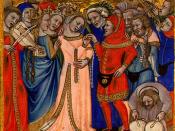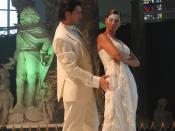Part of the Catholic Church's teachings on marriage is that a valid, sacramental union is indissoluble. So what this means is that two baptized persons who are married in accordance with the law, and whose union has been consummated, are bound in an indissoluble union sanctified by God until the death of one of the parties.
For a considerable period within the history of the church there was some debate as to what precisely made a marriage. One view held by the school of law of Bologna, for instance, maintained that the element which made the marriage was consummation. On the other hand an opposing view held by the law school of Paris, held that it was consent which made the marriage valid. This debate was resolved during the reign of pope Alexander III: from this time onwards, the authoritative teaching in the church was that consent makes marriage.
The three essential elements required for the validity of a canonical marriage are capacity, consent and prescribed form: out of these three, the most important one is consent, because it constitutes the essence of marriage, besides the fact that it is required by the very nature of marriage.
Now, matrimonial consent may be defined as an act of inter-subjective relationship, by which two sexually different persons mutually give and accept each other as persons to set up an intimate community of life and love, to attain their own well-being and for procreation and education of children.
So, consent may be defined as an act of will made by both parties to set up marriage. A marriage can be declared null and void, if the consent was in some way defected: i.e. defects that can affect the intellective and volatile faculties that make up the psychological process of a human act, which...


